“Artery-clogging saturated fat.”
It just rolls off the tongue, doesn’t it?
Decades of public health messages and magazine articles have practically etched those words in stone, but maybe it’s time to reframe the way we look at saturated fat.
In the following article, one of my nutrition interns, Anna, takes a deeper look at the research on saturated fat and heart disease. UPDATE: I have also added additional studies to this article as new research is published on the topic.
—
We all know that saturated fat, and most fat in general, has been vilified for the last 30 to 40 years.
In more recent years we’ve come to accept and even welcome unsaturated fats (“good fats”) that are abundant in plant foods and fish (vegetable oils, nuts, seeds, avocados etc.) Most everyone can agree that trans fats still remain in the “villain” category, but some recent research has showed that saturated fats may not be as bad as we have been told.
Before we dive into the research, let’s have a quick review on what saturated fats are and a little bit about their history.
What is a “saturated fat”?
Fats are considered “saturated” or “unsaturated” based on their chemical structure. Saturated fats are so named because they are fully “saturated” with hydrogen atoms.
Because of this, saturated fats (or saturated fatty acids (SFAs), as researchers call them) do not contain any double bonds in their chemical structure and are very stable, meaning they don’t go rancid easily, even when exposed to high temperatures, light, or oxygen (one reason that coconut oil is so great for cooking)
Unsaturated fats are not fully “saturated” with hydrogen, so they contain at least one double bond. Taking this one step further, monounsaturated fats have one double bond, while polyunsaturated fats have many.
But enough of the chemistry…
When it comes to cooking and food, saturated fats stay solid at room temperature, while unsaturated fats are liquid at room temperature. Think butter vs. olive oil.
Saturated fats are found in both animals (pork, beef, chicken with skin, butter, cheese, milk, etc.) and plants (coconut oil, palm oil, palm kernel oil) however most plant foods contain a higher proportion of unsaturated fat. Keep in mind that, with few exceptions, all foods are a mix of both saturated and unsaturated fats.
The War Against Saturated Fat
Historically speaking, the attacks on fat began in the late 1970s. Around this time, one key study showed that dietary fat was related to heart disease. More specifically, saturated fat was blamed to be the culprit.
Ancel Keys was behind this study, the Seven Countries Study, which looked at the diet and health of about 13,000 middle-aged men in the U.S., Japan and European countries. This study found that populations who consumed a large amount of saturated fats from meat and dairy had high levels of heart disease, while those who ate more grains, fish, nuts and vegetables did not have high levels of heart disease. Keys advocated for his theory that fat caused heart disease and persuaded the American Heart Association to release guidelines against saturated fat in 1961.
Some researchers attempted to speak out against the study as they realized Keys chose countries that confirmed his hypothesis and excluded other countries, such as France, where diet is rich in fat but heart disease is rare. Later, when outside researchers reanalyzed Keys’ original data, they found that the biggest correlation with heart disease was actually sugar, not fat.
Unforeseen Consequences of a Low-Fat Diet
If fat intake was going to be decreased, what was going to replace it?
Taking away fat meant taking away some of the delicious-ness from the food. The easy answer to replacing that eliminated delicious-ness was to add sugar!
Added sugar consumption in the US skyrocketed after this time as well as processed food production, and coincidentally the obesity epidemic as well as the rise of many other diseases, such as diabetes, began.
Despite this, we stuck with our guidelines and kept blaming our problems on saturated fat.
Noticing the rising rates of obesity, cardiovascular disease and diabetes, some researchers decided to re-investigate the effects of dietary saturated fat. Of course, these researchers have come under some fire for attempting to disprove a long-held belief, but let’s take a look at what they found when it comes to saturated fat and heart disease.
Saturated Fat: Does is Really Clog Your Arteries?
It’s been widely believed that saturated fat causes serum cholesterol to increase, which increases the risk of heart disease. This may actually not be true and there are many studies and reviews that question the perceived harmful effects of saturated fat on heart disease.- A 2020 systematic review and dose–response meta-analysis of the relationship between saturated fat intake and risk of stroke found that “Higher dietary saturated fat intake is associated with a decreased overall risk of stroke,” specifically that and every 10 gram per day increase in saturated fat intake is associated with a 6% relative risk reduction in the rate of stroke. The authors suggested that dietary limits on saturated fat in current guidelines be reexamined.
- A 2020 paper from the Journal of the American College of Cardiology on saturated fat and cardiovascular disease found that “There is no robust evidence that current population-wide arbitrary upper limits on saturated fat consumption in the United States will prevent CVD or reduce mortality.” Furthermore, they noted that saturated fat in the context of whole foods is not the same as isolated saturated fat in processed foods. Specifically, “Several foods relatively rich in SFAs, such as whole-fat dairy, dark chocolate, and unprocessed meat, are not associated with increased CVD or diabetes risk.”
- In 2014, a systematic review and meta-analysis was conducted on the association of dietary, circulating and supplement fatty acids with coronary risk. It was concluded that “the current evidence does not clearly support cardiovascular guidelines that encourage high consumption of polyunsaturated fatty acids and low consumption of total saturated fats” (Annals Intern Med, 2014)
- In 2010, 21 studies including approximately 350,000 subjects also found that saturated fat was not associated with an increased risk of coronary heart disease (Am J Clin Nutr, 2010). Several others found the same result (Nutrition, 2012) (J Clin Epidemiol)(Adv Nutr, 2013) (J Pak Med Assoc, 2012) (Neth J Med, 2011)
- In 2009, more than 160,000 individuals from 9 different cohorts were studied regarding a relationship between saturated fat intake and chronic heart disease risk (CHD). No significant association was found (Arch Intern Med, 2009).
- Another study in 2010 looked at more than a million people from 10 various countries on 4 continents. It was found that consumption of processed meats was associated with significantly higher incidence of chronic heart disease (CHD), while consumption of unprocessed red meat was not associated with CHD. (Circulation, 2010) [Note from Lily: When opting for “unprocessed” red meat, take it a step further and opt for grass-fed. Here’s 7 reasons why grass-fed is worth the money.]
- A 2013 study found that high levels of LDL (“bad” cholesterol) circulating in the blood were susceptible to lipid peroxidation which resulted in oxidized LDL being scavenged by macrophages lining certain arteries, specifically around the heart, which led to atherosclerosis (clogging the arteries). While this process was found to be true, the evidence that saturated fat had a role in this process was lacking (Lawrence, Adv. Nutr., 2013) Despite the lacking evidence, the American Heart Association still says, “Eating foods that contain saturated fats raises the level of cholesterol in your blood.” (AHA, 2016)
What Does This All Mean?
While the full effects of saturated fat remain a bit controversial, there is currently not enough evidence to link saturated fat to heart disease.
On the contrary, our obsessive avoidance of saturated fat has led many people to eat more carbohydrates and polyunsaturated fats, both of which have been linked to higher rates of heart disease. (Open Heart, 2014)
Amidst the controversy, one thing is clear: When it comes to preventing heart disease, avoiding saturated isn’t the best strategy.
A big thank you to my nutrition intern, Anna Pashkova, for her assistance with this post!
—
Before you go, I’d love to hear from you:
- Have you been told to “eat less saturated fat” or that “saturated fat causes heart disease”?
- What are your thoughts about “artery-clogging” saturated fat after reading through this research?
Let me know in the comments.
Until next week,
Lily
PS – If you’re curious to hear my thoughts on the debate between coconut oil and vegetable oil, read this.

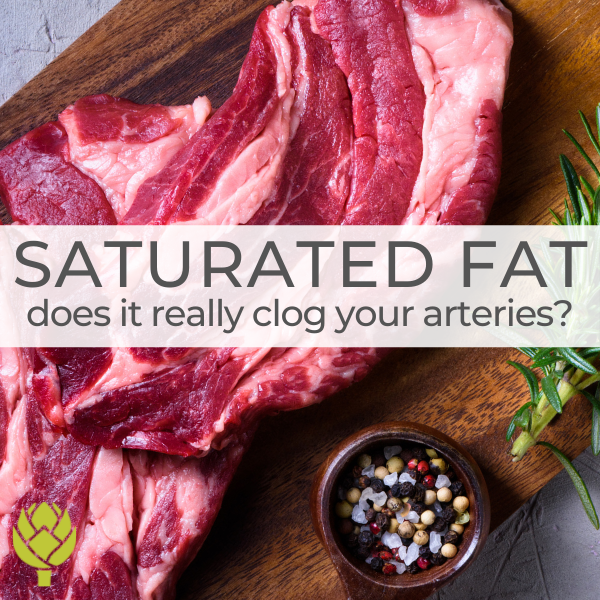

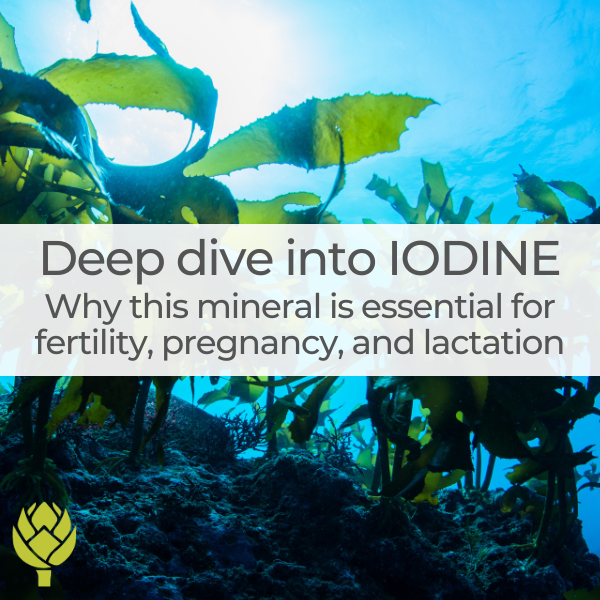
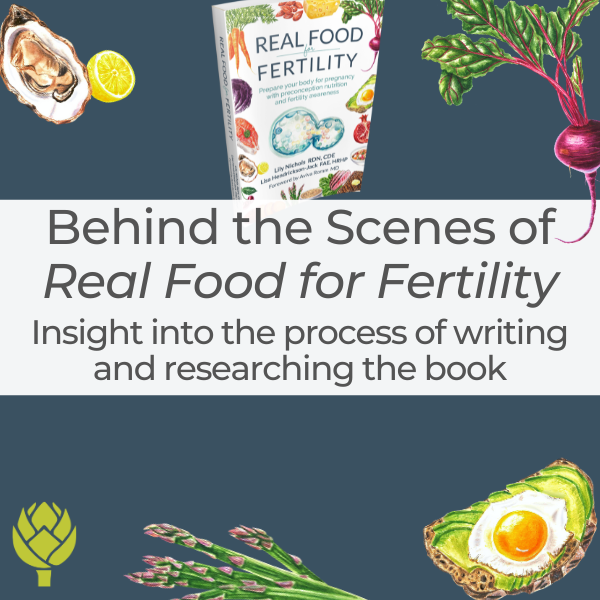
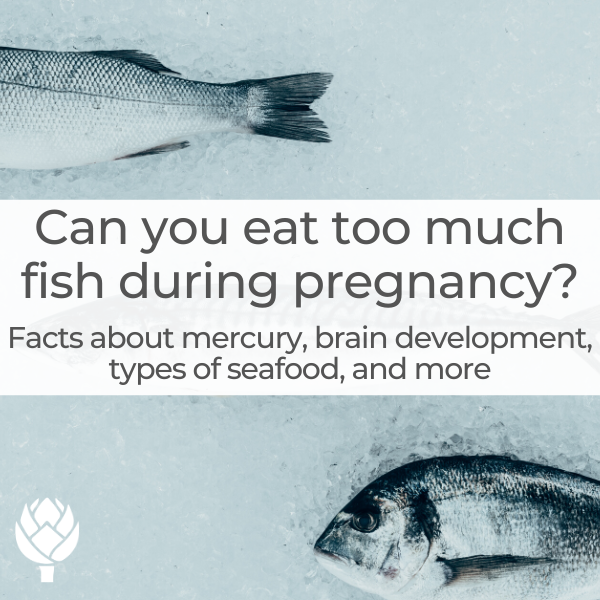
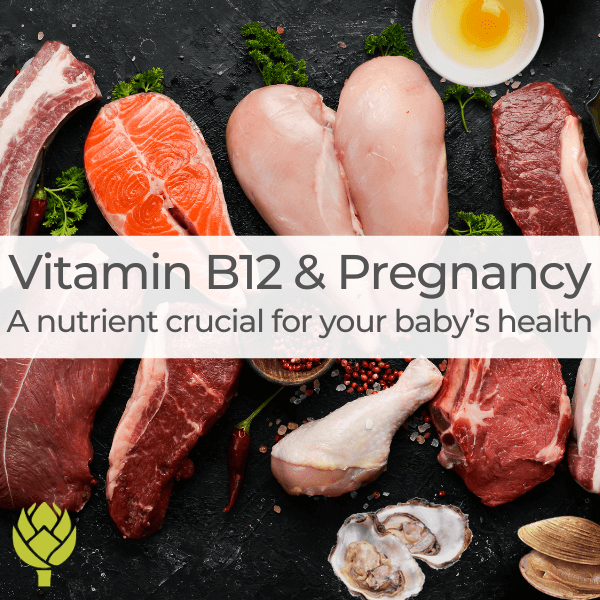




Great article. As has proven over and over again sugar is the real villain.
Thanks for the clarifying post.
Thanks for this crystal clear collation of data and information
Hi,
The American Medical Associate is going to come out with an article soon entitled “Whoops, we made a mistake”. I have increased my consumption of saturated fats over the last 15 years due to new studies that I’ve been reading. I am sorry that so many people got confused by the inaccurate information back in the 60’s – leading the majority of American society into believing that they should be on a low fat, high carb diet which lead to the giant obesity, heart disease, diabetes problems we see today.
Still waiting for this!
Great post! A nice rundown of the comedy of errors that has been the US Dietary Guidelines. I would also note that so called healthy Polyunsaturated fats are loaded with Omega 6 fatty acids. If one’s intake of Omega 6 is too high in proportion to Omega 3 it leads to inflammation which is linked to all sorts of nasty diseases.
https://www.ncbi.nlm.nih.gov/pmc/articles/PMC3335257/
Absolutely true, which is why simple swaps like using coconut oil in place of vegetable oil is way healthier!
It’s plausible that some saturated fats could increase metabolic risk when combined with lots of fast-acting carbs (not that there is a healthy way to eat these!) as in cake recipes.
This is because palmitic acid (C16) is the main saturated fat that you make from carbohydrate, so you’d be doubling down on it, and not burning it because of the carbs. This is a combination that promotes inflammation and won’t happen without a high GI diet.
But the lauric acid ( C12) in coconut oil doesn’t favour this pathway because it’s quite hard to turn it into C16, and easy to turn it into energy.
So while using coconut oil may raise LDL cholesterol it is likely to decrease inflammation at the same time.
Somewhere in my collection I have a paper where a rabbit was fed a diet of 60% coconut oil for a year. It was fine. For the first 6 months its cholesterol rose, but by the end of the year it was completely back to normal – so maybe feeding studies that look at the effect of lauric acid on LDL are just too short-term to give the full picture. I hear all the time of overweight people with high cholesterol switching to LCHF diets, using some coconut oil to cook with, and their LDL cholesterol comes down. I think it’s lean, healthy people who are more likely to see a significant increase, and what this means, no-one knows, as they seem to stay lean and healthy.
Agreed, George. Individual variation for sure. And in my clinical experience, the rise in LDL when eating more real food fats and less refined carbs is from large, fluffy LDL particles (anti-inflammatory) vs the small, dense kind (inflammatory), but most people are not having advanced lipid testing done to differentiate. At the end of the day, the rise in HDL and massive drop in TG seen after these dietary changes probably makes the whole LDL obsession a mute point. (<-- but you already know that). 😉
I’m so tired of having the cholesterol stand-off with my doctor. I asked her to take it off any blood tests I have, but one slipped through. My overall numbers are high, but that’s mostly HDL. LDL is low. But because their algorithm says to introduce statins when cholesterol is high, they did so. Now that pathology report is on my record, is can’t be expunged. My doctor asked me last visit if I wanted to check my levels, which I politely declined. Her response? So, you want to go to your grave not knowing what your cholesterol level is? Yup. (I eat a whole food diet high in vegetables and meat based on LCHF principles, am fairly fit, have no high blood pressure, don’t smoke, drink alcohol in moderation. I reckon this is good reason to avoid medication!)
Thank you for presenting this great data! Question-so if high ldl levels do not lead to cvd risk, what are the implications/risks of LDL levels increasing due to eating more real foods that are high in not only saturated fats but cholesterol? I’ve done blood work pre/post increasing my intake of meat/liver/yolks etc eating more LCHF diet and have seen my LDL levels increase, are there studies you’ve come across or any publications that discuss if there are any implications of directly elevating LDL/total cholesterol levels? and how high is too high?
This is an ongoing topic of debate. I recommend checking out the work of Dave Feldman of Cholesterol Code.
I’m by no means familiar with all the recent research on saturated fat and omega-3 versus omega-6, but I’ve seen a recent study from the University of Eastern Finland led by Jyrki Virtanen that claims a high intake of omega-6 does not actually lead to increased inflammation. I’m currently reading your book, and really love all the information you present and the critical attitude you take towards health recommendations. However, I’m hesitant to embrace saturated fats, given the hugely-mixed attitudes and mixed evidence surrounding them. Any thoughts on this recent study? Thanks so much!
Thanks do much for your amazing books and this blog! I have s question, I was surprised when I read than animal fat increased sugar in blood and insuline resistance? Is that true? Or just correlation in individuals with unhealthy diet. Thank you
I eat mostly high fat low carb and recently had blood work done. Seems my triglycerides and LDL are high while my HDL is low. I’m not pregnant currently but I want to follow this diet in my next pregnancy. Any studies looking at cholesterol in pregnancy eating high fat?
Thank you for all of your work! I too have recently had bloodwork done and after switching to a higher meat based diet my cholesterol and LDL have increased. My triglycerides remain low. I am eating for fertility and hopefully pregnancy soon. My question is, when buying grass fed beef / pork, is there a certain cut that is more beneficial? I want to be buying the least expensive yet nutritious cut. Any suggestions?
Thanks for the info in this post. As with some of the other commenters. I’ve been eating a real foods/whole foods diet with natural fats for years, and inspired by your posts on breakfast and blood sugar, have revolutionized my breakfast s as well this past year. My LDL is persistently in the 120’s, and cholesterol in the 200’s. I know the answer can’t be to eat more low-fat foods as my doctor advises, but it’s hard to know how much to worry about this, if at all!
Someone was just telling me that meat is bad because it clogs the arteritis … and while I know long time that is wrong, I don’t have the best memory of how to explain the details to other people.
Immediately came to your blog and typed in “fat” and voila … I have the summary and reliable resources to show my friends!
So thankful for this blog!
Great article! Bookmarking it for later to reference to other dietitians and friends. I just wish the government would get on board…
I eat a lot of saturated fat (by the bucket full) I lost 50 lbs. My doctor couldn’t figure out why my triglycerides were so low.( Fat in blood) maybe it is because I eat a very low carb diet.
I got sent this article by someone on Instagram saying that saturated fat is really good for babies but none of the studies are done on babies.